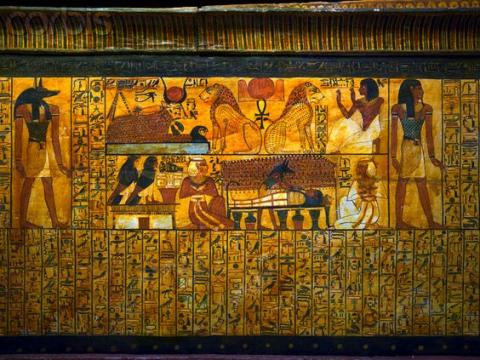Conference: Rethinking the visual aesthetics of ancient Egyptian writing.
‘Rethinking the visual aesthetics of ancient Egyptian writing.’
Photo: Detail from outer coffin of Khonsu, from Tomb of Sennedjem, Luxor, c.1270 bc. Egyptian Museum Cairo/photo © Jürgen Liepe.
This virtual conference is co-organised by Stephen Quirke (University College of London), Rita Lucarelli (University of California, Berkeley) and Hany Rashwan (University of Birmingham); and hosted by the Institute of Archaeology (UCL) and the Department of Middle Eastern Languages and Cultures (UC Berkeley).
With special thanks to the conference team: Rachel Barnas (University of California, Berkeley), Beatrice De Faveri (University of California, Berkeley), Walid Elsayed (Sohag University), Maysa Kassem (Fayum University), Jason Silvestri (University of California, Berkeley).
The conference will be live-streamed on Thursday 18, Friday 19 and Saturday 20, November 2021
After the conference, the talks will be posted on the ARCE Northern California Youtube Channel.
For the full conference programme, including times of sessions and abstracts please refer to the PDF document linked at the bottom of this page.
For the convenience and security of our participants and attendees we will be hosting the conference panels using passcode protected Zoom meetings. We kindly ask you all to register beforehand. Thank you!
Zoom Link
Passcode: 065206
Thursday, November 18, 2021
- Welcome and Opening remarks (Hany Rashwan, Rita Lucarelli, Stephen Quirke)
- Welcoming keynote lecture: Wonderful signs: aspects of visuality in Ancient Egyptian (hand)writing, Ursula Verhoeven, Johannes Gutenberg University Mainz.
Session 1: Pictorial realism and writing strategies
- An art-historical perspective on New Kingdom monumental hieroglyphs, Marina Sartori, University of Basel.
- Ancient Egyptian hieroglyphs perception through embodied cognition and pictorial realism: towards an ontology of active imagination in Ancient Egypt, Andrea Pasqui, Politecnico di Milano, Todd Shimoda, Thinkers Tools, Inc., Stefano Natrella, Accademia delle Belle Arti di Brera, Milano.
- The devil is in the fishtail: Visual writing and written visuals in private tomb scenes, Nicky van de Beek, Johannes Gutenberg University in Mainz.
Session 2: Reception and representation
- Writing and Creation: Hieroglyphs in Egyptian religious discourse from the Graeco-Roman Period, Katherine Davis, University of Michigan.
- Modes of reception and adaptation of the Egyptian writing in the inscribed Aegyptiaca from archaic Greece, Panagiotis Kousoulis, University of the Aegean.
- How to think in Hieroglyphs? Visual speech and the vocal discourse of the Heart: Logical strategies of the aesthetic representation in the Egyptian hieroglyph script, Amr El Hawary, American University of Cairo.
Friday, November 19, 2021
Session 1: Creative deployment of glyphs
- “The signs revealed their forms. He called to them and they answered to him”: The anthropomorphized hieroglyphs as (inter)active image-text compositions in Ancient Egypt, Ghada Mohamed, Cairo University.
- Calling out the name: towards a theory of embodiment for ancient Egyptian personal names, Julia Clare Francis Hamilton, University of Leiden.
- The Importance of Being B3: Classifying msj in the Religious Hymns of the New Kingdom (ca. 1539-1077 BC) – between visual aspects and semantic implications, Guilherme Borges Pires, NOVA School of Social Sciences and Humanities, Lisbon.
- "To Make Them See Your Majesty”: The Visual Program of the “Poetical Stela” of Thuthmosis III, Scott Noegel, University of Washington.
Session 2: Written content and spatial context
- The Visuality of Cursive Story Writing in Ancient Egypt, Nikolaos Lazaridis, California State University Sacramento, Tara Prakash, College of Charleston.
- Graphic syntax and ontology in the Book of Two Ways, Jordan Miller, University of Oxford.
- Deciphering Akhenaten’s Art Style in Relationship to his Theology of Light, Mario H. Beatty, Howard University.
- Crucible shape in Old Kingdom Metalworking Scenes: From Visual to Technical Interpretations, Ahmed Mansour, Bibliotheca Alexandrina’s Writing and Scripts Center.
Session 3: Verbal-pictorial metaphors
- Visual Poetics in ancient Egyptian and Chinese writings: A comparative study, Tian Tian, University College London.
- Hidden Images of Ritual Power: A New Look at Crypt South 3 in the Temple of Hathor at Dendera, Barbara A. Richter, University of California, Berkeley.
- Encoding the Sacred: New Lights on Ramesside Enigmatic Writing, Stéphane Polis, University of Liège; Philipp Seyr, Ludwig Maximilians University Munich.
- Second keynote Lecture
- “L' Égypte. Elle est tout pour moi, je suis tout pour elle.”: Rethinking the personal life of Jean-François Champollion (1790-1832), Yves Champollion, CEO of Wordfast LLC.
Saturday, November 20, 2021
Session 1: Innovation and writing practice
- The names of Menhyt and Nebtu in the Litanies of Esna; or, the use of figurative writing in the definition of one goddess, Federica Pancin, Sapienza University of Rome.
- Dances with Kings: movement and dance-related lexemes in the Pyramid Texts, Angelo Colonna, Sapienza University of Rome; Francesca Iannarilli, Ca’ Foscari University of Venice.
- Writing strategies in Old Kingdom mortuary contexts: creativity, flexibility, and the potency of the hieroglyphic script, Christelle Alvarez, Freie Universität Berlin.
- Mutilated and left for dead? Revisiting the ancient Egyptian use of incomplete hieroglyphs of living beings, Rune Nyord, Emory University.
Session 2: Visual creativity of “determinatives”
- Visualising meaning and reading organically: Towards an emic perspective on determinatives, Angela McDonald, University of Glasgow.
- Determinatives of the verb Hmsỉ “to sit” in context, or can sitting be kneeling? Edyta Kopp, University of Warsaw.
- The (Other) World in Words: Determinatives as ‘Telltale’ Icons Encoding the Egyptian Duat, Silvia Zago, University of Liverpool.
- Curse like an Egyptian: On the determinatives of verbs Stm and Sna, Ahmed Osman, American University of Cairo.
- Closing keynote Lecture: Evolution of simplicity and conspicuous communication in Sinai around 1900 BC. Looking at the old-new “hieroglyphic” beauty of early alphabetic writing, Ludwig Morenz, University of Bonn.
